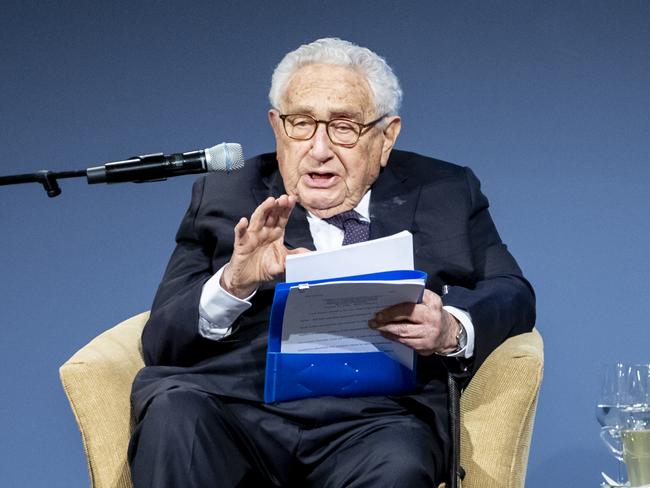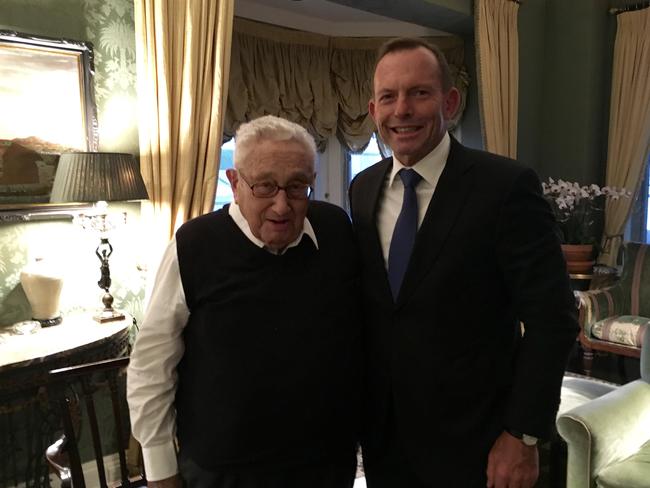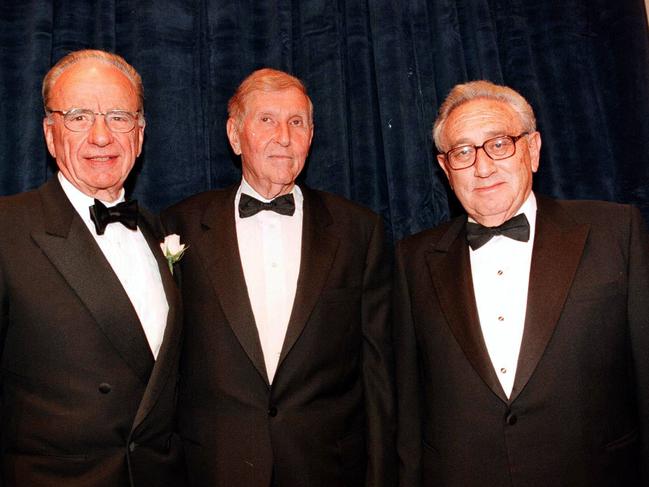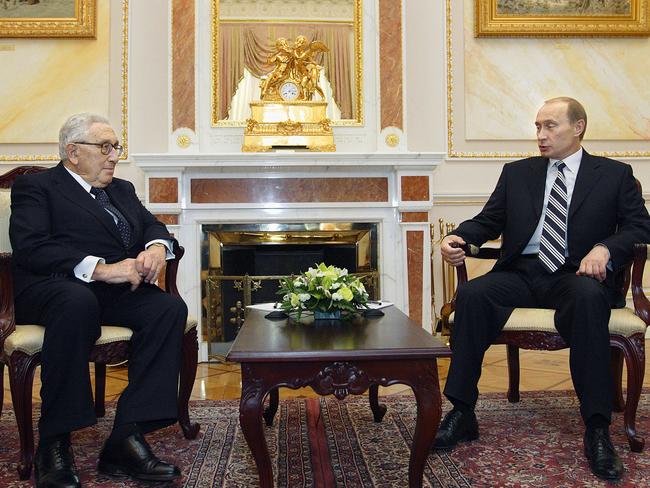‘Endlessly generous’: Tributes flow for Henry Kissinger dead at 100
Tributes have started flowing in from around the world for former US Secretary of State Henry Kissinger, who has died aged 100.
World
Don't miss out on the headlines from World. Followed categories will be added to My News.
A true giant of 20th century US and world diplomacy, Henry Kissinger has died aged 100.
He died at his home in Connecticut, according to his consulting firm Kissinger Associates, although his cause of death was not revealed.
Kissinger is survived by his wife of nearly half a century, Nancy Maginnes Kissinger, his children David and Elizabeth from his first marriage, and five grandchildren.
He is expected to be interred at a private family service before a memorial service is held in New York City.

Tributes have started pouring in from around the world.
Former US president George W. Bush said Kissinger was one of America’s “most dependable and distinctive voices on foreign affairs”.
“I have long admired the man who fled the Nazis as a young boy from a Jewish family, then fought them in the United States Army,” he said.
“When he later became Secretary of State, his appointment as a former refugee said as much about his greatness as it did America’s greatness.
“He worked in the administrations of two presidents and counseled many more. I am grateful for that service and advice, but I am most grateful for his friendship.”
Former New York City Mayor Mike Bloomberg described Kissinger’s death as “a loss for our country and the world – and all of us who were fortunate enough to call him a dear friend and mentor”.
Nobody in our country exercised more influence over global affairs over a longer period of time than Henry Kissinger, and his death is a loss for our country and the world – and for all of us who were fortunate enough to call him a dear friend and mentor. Henry was incredibly… pic.twitter.com/D7BQpaUcXL
— Mike Bloomberg (@MikeBloomberg) November 30, 2023
“Henry was incredibly kind and unfailingly devoted to his friends – a side of him that the public rarely saw – and endlessly generous with the wisdom he gained over the course of an extraordinary life that included escaping Nazi Germany for New York, serving in World War II, and rising to become on the the most consequential public figures in American history, more so than many presidents,” Mr Bloomberg shared in a post on X, formerly Twitter.
Dr Michael Green, the head of Sydney’s United States Studies Centre, said Kissinger’s childhood as a Jewish refugee who fled Nazi Germany “taught him the consequences of disorder for humanity”.
“He dedicated his life to harnessing American power to achieve a sustainable and stable global order – not always successfully but always with a deep sense of history and purpose,” he said.
French President Emmanuel Macron said Kissinger was a “giant of history” and offered France’s “condolences to the American people”.
Kissinger’s “century of ideas and diplomacy had a long-standing influence on his time and on our world,” Mr Macron posted to X.
UK foreign minister David Cameron said Kissinger was a “great statesman” who will be “greatly missed on the world stage”.

Russian President Vladimir Putin praised Kissinger for his contribution to US-Soviet relations and describing him as a “wise and visionary statesman”.
“Henry Kissinger’s name is inextricably linked with his pragmatic foreign policy, which in its time paved the way for a detente in international tensions and made it possible to reach the most important Soviet-American agreements that contributed to strengthening global security,” Putin said in a statement released by the Kremlin.
German Chancellor Olaf Scholz hailed Kissinger for his “commitment to the transatlantic friendship”.
“He always remained close to his German homeland. The world has lost a great diplomat,” Scholz wrote on X.
China hailed Kissinger as an “old friend”, paying tribute to a diplomat central to establishing ties between Beijing and Washington.
In China, he is granted the sobriquet of “old friend of the Chinese people” for his part in establishing ties back in the 1970s and helping bring the country out of its Mao-era isolation.
“During his life, Dr. Kissinger attached great importance to China-US relations and believed that they were vital to the peace and prosperity of the two countries and the world,” foreign ministry spokesperson Wang Wenbin said, describing him as an “old and good friend of the Chinese people”.
Kissinger last visited China as recently as July, when he held talks with President Xi Jinping.
In a lengthy obituary on Thursday, Beijing’s state broadcaster CCTV hailed his “historic contribution to the opening of the door to US-China relations”.
“Kissinger had a deep bond with China,” it said, noting his “many meetings with Chinese leaders”.
‘REALIST, WARMONGER’: KISSINGER DIVIDED OPINIONS
Born in 1923 in Germany, Kissinger was arguably the single most important figure to shape US foreign policy during the Ford and Nixon administrations, although his views were sought by governments and corporations into his 100th year.
As recently as July 2023 he met with China’s top diplomat and defence minister during a visit to Beijing. And in October he was writing about the dangers of artificial intelligence (AI), and how the US and China should work together to regulate its use.
He was also there at the White House State Dinner in honour of Australian Prime Minister Scott Morrison in September 2019.



AI was one of Kissinger’s preoccupations in recent years. In 2018, he penned an influential essay warning about its rise, with an ominous warning that its development should be controlled before it is “too late”.
Ever quotable, Kissinger was most famously known for his observation that “power was the ultimate aphrodisiac”.
He had been married to second wife Nancy since 1974. His first marriage ended in divorce after 15 years.


Kissinger divided opinions. Some derided him as a warmonger, an architect of the Cold War, responsible for international crimes; others said he was a realist, and his advice to successive US administrations prevented worse atrocities.
He was awarded the Nobel Peace Prize in 1973, the year Washington DC formally restarted relations with Communist China. (Kissinger’s first secret negotiations with Chinese dictator Mao Tse-Tung were in 1971.)

Of Kissinger’s Nobel Peace Prize, performer Tom Lehrer quipped it “made political satire obsolete”.
In his book Diary of a Foreign Minister, Bob Carr referred to him as “my favourite world historical figure” and also “my greatest friend and supporter”.
Kissinger was less enamoured of another Labor figure, Gough Whitlam, reportedly describing him as a “bastard” after the then Prime Minister criticised America’s bombing of Vietnam in 1972.
As Secretary of State during the Nixon administration, it was to Kissinger that the president addressed his resignation letter on August 9, 1974, at the height of the Watergate scandal.
More Coverage
Originally published as ‘Endlessly generous’: Tributes flow for Henry Kissinger dead at 100




